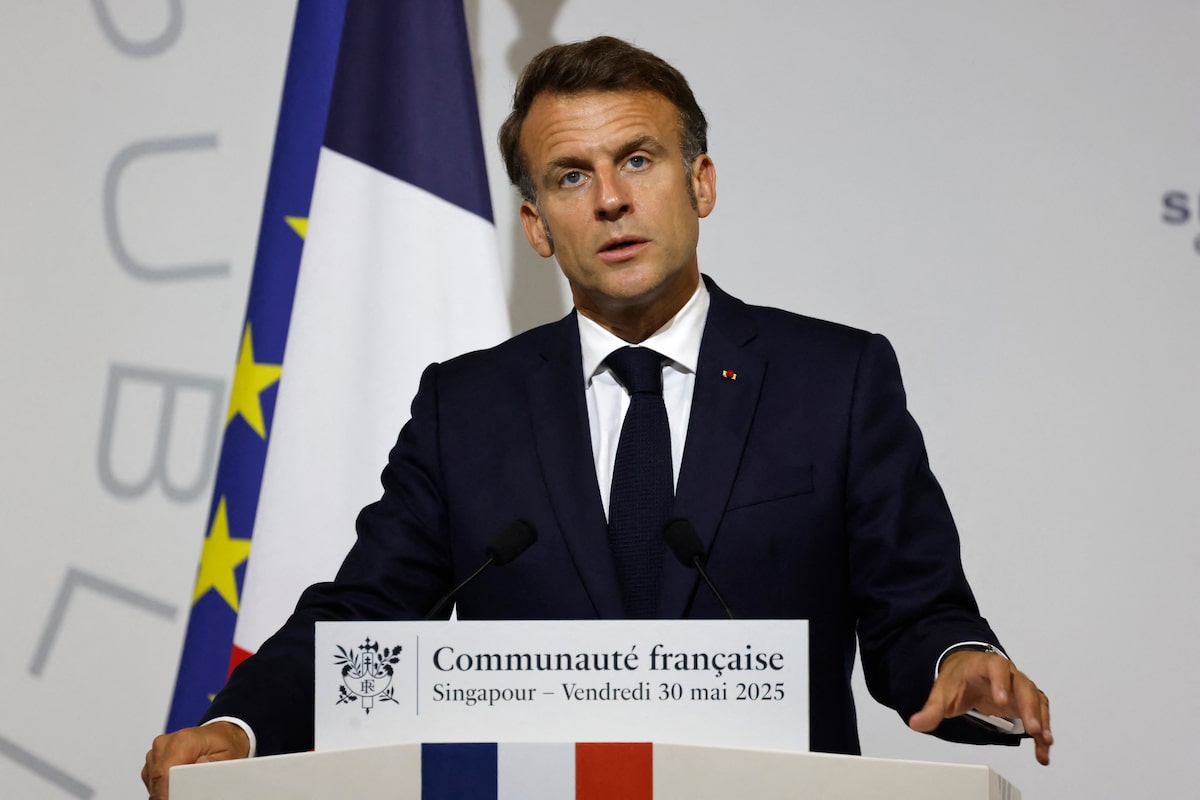France’s President Emmanuel Macron delivers an address during a reception at the International French School in Singapore on Friday. The leader is set to open the Singapore security conference with a keynote speech on Friday night.LUDOVIC MARIN/AFP/Getty Images
French President Emmanuel Macron and U.S. Defence Secretary Pete Hegseth are among the world leaders, diplomats and top defence officials in Singapore this weekend for a security forum that will focus on China’s growing assertiveness, the global impact of Russia’s war on Ukraine and the flare-up of conflicts in Asia.
Macron opens the conference with a keynote address Friday night that is expected to touch on all of those issues, as well as the pressure the hefty tariffs announced by U.S. President Donald Trump’s administration is putting on Asian allies.
It’s Hegseth’s first time to the Shangri-La Dialogue, hosted by the International Institute for Security Studies, which is taking place against the backdrop of heightened rhetoric between Beijing and Washington. The Trump administration has threatened China with triple-digit tariffs, and there’s some uncertainty in the region over how committed the U.S. is to the defence of Taiwan, which also faces possible 32-per-cent American tariffs.
China claims the self-governing democracy as its own, and Chinese President Xi Jinping has not ruled out taking it by force. China sends military aircraft, ships and spy balloons near Taiwan as part of a campaign of daily harassment, and currently has an aircraft carrier in the waters southeast of the island.
Hegseth told reporters before he boarded his plane for Singapore that Washington’s policies were meant to deter a Chinese invasion of Taiwan.
“We seek no conflict with anybody, including the Communist Chinese,” he said. “We will stay strong for our interests. And that’s a big part of what this trip is all about.”
China, which usually sends its defence minister to the Shangri-La forum, sent a much lower level delegation instead, represented by Major-General Hu Gangfeng, the vice-president of the People’s Liberation Army National Defense University. The delegation was expected to speak Saturday on a panel on “co-operative maritime security” alongside representatives from Japan, Vietnam, Chile and the U.K. – notable in that China’s aggressive global fisheries tactics have been a regular topic of concern not only in the Indo-Pacific but as far away as Latin America and the Arctic.
U.S. Defence Secretary Pete Hegseth, left, meets with Philippines Defence Secretary Gilberto Teodoro in Singapore on Friday, during his second trip to the region since taking up the position.MOHD RASFAN/AFP/Getty Images
Defence officials travelling with Hegseth, who spoke on the condition of anonymity because they were not authorized to speak to the media, called the absence of a higher-level Chinese delegation an opportunity for the U.S. to make inroads.
“We can’t account for whether China engages or not. All we know is that we’re here. And we will be here,” Hegseth said as he met with Philippine Defense Secretary Gilbert Teodoro.
Hegseth’s trip to Singapore is his second to the region since becoming defence secretary, following a March visit to the Philippines, which has seen escalating confrontations with China over competing territorial claims in the South China Sea.
The U.S. has been pursuing a “free and open Indo-Pacific” policy, which includes regularly sailing warships through the Taiwan Strait and in the South China Sea, which is claimed almost in its entirety by China.
The European Union has adopted a more economics-driven approach, but several European nations have also regularly taken part in the freedom of navigation exercises, including France, which sent a carrier strike group on a five-month mission through the Indo-Pacific that concluded in April.
In its published Indo-Pacific strategy, France has underscored the need to “preserve a rules-based international order” in the face of “China’s increasing power and territorial claims” and its global competition with the United States.
As defence spending ramps up, here’s where investors see opportunities
France’s own ties to the Indo-Pacific are strong, with more than 1.6 million of its citizens living in the region in French overseas territories.
Following a meeting Friday with Singapore’s Prime Minister Lawrence Wong, Macron told reporters there was room in the region for more than just the two superpowers.
“We are neither China nor the U.S., we don’t want to depend on any of them,” he said. “We want to co-operate with both as far as we can, and we can co-operate for growth and prosperity and stability for our people and the world order, and I think this is exactly the same view of a lot of countries and a lot of people of this region.”
Wong underscored Macron’s point, saying that Singapore and the greater region were not looking for exclusive arrangements with any single power.
“We want to embrace comprehensive engagement with all parties and embrace win-win arrangements rather than zero-sum competition,” he said.
